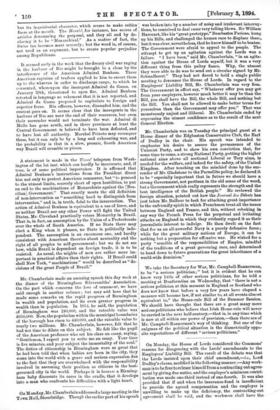A statement is made in the Times' telegram from Wash-
ington of the 1st inst. which can hardly be inaccurate, and, if true, is of some political importance. It is affirmed that Admiral Benham's instructions from the President direct him not only to protect American commerce, but "to proceed to the utmost limits, scarcely short of open hostilities, to put an end to the machinations of Monarchists against the [Bra- zilian] Government." That exactly meets the old definition of non-intervention as "something hard to distinguish from intervention," and is, in truth, fatal to the insurrection. The action of Admiral Benham is equivalent to a use of force, and as neither Brazil nor any other Power will fight the United States, Mr. Cleveland practically vetoes Monarchy in Brazil. That is, in fact, an assumption by the Union of a Protectorate over the whole of South America. If no State there may elect a King when it pleases, no State is politically inde- pendent. The assumption is an enormous one, and hardly consistent with American theories about neutrality and the right of all peoples to self-government; but we do not see how, while Brazil is dependent on foreign trade, it is to be resisted. As usual, the mights of men are rather more im- portant in practical affairs than their rights. If Brazil could shell New York, " machinations " would be described as "de- cisions of the great People of Brazil."


































 Previous page
Previous page